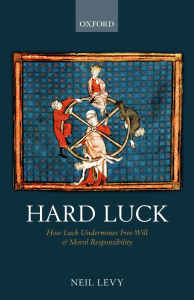This is a book summary of Hard Luck: How Luck Undermines Free Will and Moral Responsibility by Neil Levy (Amazon).
Quick Housekeeping:
- All content in “quotation marks” is from the author (otherwise it’s paraphrased).
- All content is organized into my own themes (not the author’s chapters).
- Emphasis has been added in bold for readability/skimmability.
Book Summary Contents:

How Luck Undermines Free Will and Moral Responsibility: Hard Luck by Neil Levy (Book Summary)
About the Book
“I have been arguing that responsibility is rarer than most philosophers think as long as I have been writing about the topic. It has gradually dawned on me that the arguments I have advanced can be generalized to cover all agents in all situations. This book is an attempt to set out relatively systematically why I believe that no one is ever responsible for anything. The view that no one is ever responsible for anything, in turn, entails that no one ever acts freely, at least on one widely accepted account of what freedom consists in.”
- “This book argues that there is no such thing as free will, at least if by ‘free will’ we mean the ability of agents to act so that they are morally responsible for their actions.”
- “The causal structure of the universe is of little interest to me (here). It is not ontology that rules out free will, it is luck … I am a disappointed compatibilist because I believe that free will is non-existent for reasons independent of determinism.”
- “This entire book is itself a defense of the necessity for, as well as the lack of, relevant control … The question concerning whether determined agents exercise freedom-level control can be conceptualized as the question of whether luck in one’s causal antecedents is compatible with freedom.”
- “In this book I have provided two basic, somewhat independent but mutually reinforcing, arguments for the claim that agents lack free will: one from luck and one from the epistemic conditions on control. I have argued that agents’ actions are too significantly the product of luck to count as free, and I have argued that agents who perform wrongful actions fail to satisfy the demanding epistemic conditions on control. I believe that these are powerful arguments against the reality of moral responsibility.”
What is Hard Luck?
“The hard luck view is the view that agents are not morally responsible for their actions because luck ensures that there are no desert-entailing differences between moral agents. It is luck that precludes moral responsibility.”
- “Since the traditional name for the view that determinism precludes free will is ‘hard determinism’, I shall call my view, that there is no free will because luck precludes it, the hard luck view.”
- “The hard luck view is a highly revisionary view: like hard determinism, acceptance of the view seems to entail significant alterations in our beliefs, in our practises, and in our self-conception.”
Types of Luck
From Duncan Pritchard and Thomas Nagel.
Duncan Pritchard’s two types of luck:
- Veretic epistemic luck (or veretic luck): An agent is subject to veretic luck if it is a matter of luck that his belief is true.
- Reflective epistemic luck (or reflective luck): The kind of luck that is alleged to be at issue in radical skeptical scenarios, in which an agent’s claim to knowledge is challenged via her alleged inability to rule out the possibility that she is (say) a brain-in-a-vat … Given what the agent is able to know by reflection alone, it is a matter of luck that her belief is true.
Pritchard says luck is a function of two factors:
- Significance: Roughly, an event or state of affairs can count as lucky only if it is significant. We generally reserve the appellation ‘lucky’ for events or processes that matter. Paradigm lucky events therefore make a difference to the lives of their subjects.
- Chanciness: An event or state of affairs occurring in the actual world is chancy lucky for an agent if (i) that event or state of affairs is significant for that agent; (ii) the agent lacks direct control over that event or state of affairs, and (iii) that event or state of affairs fails to occur in many nearby worlds; the proportion of nearby worlds that is large enough for the event to be chancy lucky is inverse to the significance of the event for the agent. An event or state of affairs occurring in the actual world that affects an agent’s psychological traits or dispositions is non-chancy lucky for an agent if (i) that event or state of affairs is significant for that agent; (ii) the agent lacks direct control over that event or state of affairs; (iii) events or states of affairs of that kind vary across the relevant reference group, and (iv) in a large enough proportion of cases that event or state of affairs fails to occur or be instantiated in the reference group in the way in which it occurred or was instantiated in the actual case.
Thomas Nagel’s four types of luck (see more here):
- Constitutive luck: Luck in the traits and dispositions that make one the kind of person one is; that is, in the traits and dispositions that constitute one. Constitutive luck is significant for an agent; it is also (usually) beyond an agent’s control. Constitutive luck is a lifelong phenomenon.
- Causal luck: Luck in ‘how one is determined by antecedent circumstances’. We lack control over the causal antecedents of our actions, which are therefore simply a matter of luck for us. But our actions are the consequences of these antecedents; hence our actions, too, are a matter of luck for us.
- Circumstantial luck (type of chancy luck): Luck in the circumstances in which one finds oneself.
- Resultant luck (type of chancy luck): Luck in the way things turn out.
Relevant Control
“Control has very demanding epistemic conditions, conditions that agents regularly, and luckily, fail to satisfy. When they do not satisfy these conditions, they lack (relevant) control over their actions, and therefore do not perform them responsibly.”
Control:
- “It is not because we lack total control that the hard luck view holds that we lack free will. It is because we lack relevant control. We do not need to possess control over all the structuring causes of our actions—the entire ensemble of circumstances upon which our actions are causally dependent—in order to possess relevant control over our actions.”
- “Relevant control requires (a) psychological control over our actions, such that if our mental states rationalize a prospective action (where to rationalize an action is to make that action the best alternative open to the agent, from his or her own point of view), if the agent acts intentionally at all, the agent will perform the rationalized action; and (b) control over the psychological states that rationalize actions, such that if an action is rationalized by the agent’s psychological states, the agent is blameworthy for that action only if he or she is blameworthy for acquiring or retaining the psychological states that rationalize it.”
- “For an agent to exercise relevant control over a state of affairs, it isn’t sufficient that that state of affairs is causally sensitive to the agent’s actions; in addition the agent needs to know that, and how, the state of affairs is sensitive to his actions.”
Beliefs:
- “Agents are never responsible for their beliefs, because they do not exercise freedom-level control over them.”
- “Agents cannot freely undo the effects of constitutive luck because free choices are rational choices, and agents’ reasons are either the product of their endowment or the product of present luck (or both). Reasons are constituted by an agent’s beliefs.”
- “Blaming agents for false beliefs requires that we locate a benighting action, an action whereby an agent knowingly and freely passed up an opportunity for knowledge, and in virtue of which they are responsible for their ignorance. But, locating such a benighting action is no trivial task. Very often there is no plausible candidate for a benighting action. The epistemic conditions on control are so demanding that they are rarely satisfied.”
Moral Responsibility
“Since luck excludes control, it is wrong to hold agents morally responsible for things that are lucky for them … The view that luck precludes moral responsibility is not unprecedented. The hard luck view has a clear predecessor in Galen Strawson’s well-known argument for the impossibility of moral responsibility.”
- “Clearly, holding that agents are never morally responsible entails both a theoretical and a practical revision in common sense.”
- “Blaming persons for what is lucky for them is morally akin to blaming them for their skin colour; it is an offense against fairness.”
- “It is not because agents do not deserve eternal torment or eternal bliss that we cannot be morally responsible: it is because we never bring about, as a result of our deliberate actions, conditions under which we deserve to be treated as less (or more) than equals in the consequentialist calculus.”
- “Criminal punishment has four different possible justifications: deterrence, rehabilitation, public protection, and retribution. Only the last must be abandoned if moral responsibility is jettisoned. We may still lock up people to deter others, to protect the public, and to give wrongdoers the skills they need to live without banning others. We are not committed to closing the prisons or shutting down the courts. We are, however, committed to doing things differently.”
- “Galen Strawson has said that luck swallows everything. As he would no doubt acknowledge, this is an exaggeration: many things survive luck. We can have knowledge even though we are always lucky to know. Morality too is proof against luck: some actions really are (morally) better than others. We can continue to have meaningful and satisfying lives, despite the pervasiveness of luck; luck entails neither that our strivings are in vain nor that our relationships are hollow. But the pervasiveness of luck is incompatible with moral responsibility, as I have defined it, and with free will, understood as constitutively linked to moral responsibility. This might be a cause for sadness for some people. But it is not a cause for despair. It has its compensations; in particular it clears the way for treating people as they deserve to be treated: equally.”
You May Also Enjoy:





